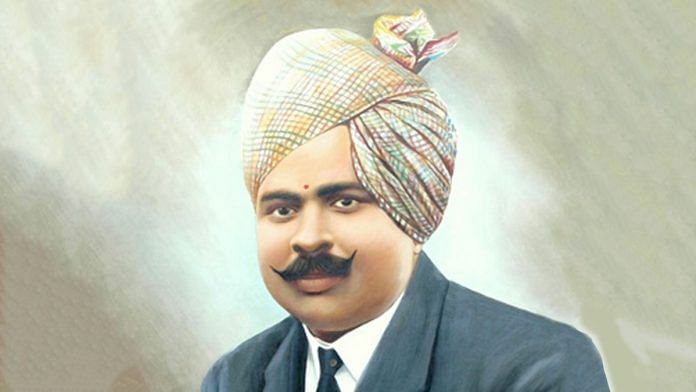Gujarmal Modi, the founder of one of India’s leading business empires and grandfather of former IPL chairman Lalit Modi, died this day 43 years ago.
New Delhi: When Gujarmal Modi once outbid an Englishman at an auction during British rule, the story goes, the latter hit back by calling him a “dirty Indian”.
But Gujarmal, the father of one of India’s leading business empires, Modi Group, was not one to be daunted by racism, and the incident only strengthened his opposition to the British Raj, with his retaliation reportedly even getting him ousted from his village.
Born on 9 August 1902, to a family of small businessmen in present-day Haryana, Gujarmal had, by his death on 22 January 1976, built India’s seventh largest conglomerate with assets worth Rs 900 crore and annual sales of Rs 1,600 crore.
Valued at $2.8 billion today, the list of companies he established includes Modi Sugar Mills, Modi Vanaspati Manufacturing Company, Modi Industries Ltd, Modi Luft, and Modi Rubber.
On his 43rd death anniversary, ThePrint looks back at the life and times of Gujarmal Modi, whose grandson, the controversial businessman Lalit Modi, went on to found the Indian Premier League (IPL).
Also read: Remembering CD Deshmukh, RBI’s first Indian governor
Intuitive
Gujarmal was born in Mahendragarh to a family that once arranged supplies “for the British cantonment from Kanpur to Peshawar”. He was the second child of Multani Mal Modi, the owner of a food grains mill in Patiala. Mal was awarded the title of ‘Rai Bahadur’ by the British for his “contribution to public welfare”.
Gujarmal joined his father’s business when he was very young — less than 20 years old — and is said to have developed a keen interest in books related to commerce and trade at an early age.
It is touted as a testament to his foresight and intuition that, at a time when the concept of insurance was yet to catch on, Gujarmal reportedly convinced his father to insure their flour mill. According to Marwar India, a magazine dedicated to the Marwari community, the factory was subsequently destroyed in a fire, but the insurance saved the family from disaster.
In 1933, Gujarmal set off for Delhi from Patiala with dreams of setting up his own business.
Looking for a location to set up his industry, he chose and bought Begumabad, a sleepy village on the outskirts of Delhi. In 1945, the town was renamed Modinagar, gaining a significant position on India’s industrial map.
Also read: Birthday tribute to Satyendra Nath Bose, the physicist after whom Higgs boson particle is named
Sugar to vanaspati
Gujarmal initially eyed a project centred on vanaspati, the vegetable cooking oil, along with his friend Narayan Das Bajoria in 1932, but it was a whole other foray that was to crystallise his standing as a businessman.
“In an effort to kickstart domestic production of sugar, the government announced a sharp increase in import duties. (Gujarmal) Modi abandoned the vansapati idea in favour of a sugar mill and this favourable turn of events led him to setting up industry after industry that would benefit thousands in return,” reads his profile on the website of Modicare Limited, a firm founded by Gujarmal Modi.
In 1939, he returned to his pet project of vanaspati, given the seasonal nature of the sugarcane business.
His next move was to use the sludge that the vanaspati mill generated, and he began producing washing soaps in 1940. Eventually, he also started manufacturing the tin containers in which the vanaspati was packed.
“What followed thereon was oil crushing plant, paint and varnish factory, glycerin extraction plant, cotton textile mill, lantern factory, steel mill, silk and yarn mill, among many others, which rose to prominence during the period from 1940-1963,” said the Modicare website.
The Second World War brought another opportunity for the businessman as he ventured into food processing for military needs of the Allied forces, of which Great Britain was a part.
“In recognition of his services, the British government conferred the ‘Rai Bahadur’ title, which his father also had, on him in 1942. Later, after the war ended, the British government, in a rare public display of appreciation, organised a grand procession in his honour in Meerut.
A death and a battle
Gujarmal died in 1976 without leaving a will, which kicked off a war over his fortune.
His stepbrother Kedar Nath Modi, who had begun to help Gujarmal in his business, took over as head of the family.
“The brothers sparred in public. Business was neglected which led to labour unrest, mismanagement, technological obsolescence and a host of other problems. The mills started shutting down one by one,” said the book Business Battles: Family Feuds That Changed the Indian Industry, by Shyamal Majumdar, as quoted in LiveMint.
In 1989, the family settled on a compromise under which Gujarmal’s five sons were given 60 per cent of the assets, and Kedar Nath’s three sons were given the other 40 percent.
The battle is said to have taken a toll on Modinagar, setting off its decline as an industrial township.



